
The 10 most important buildings in Toronto
What would Toronto be without the spike of the CN Tower, the great hall of Union Station, the modernist curve of City Hall, or the ramparts of Fort York? No-one can really say, but the city would undoubtedly be worse for their absence.
Choosing just 10 buildings for this list was a difficult task. The Gibraltar Point Lighthouse, Osgoode Hall, St. Lawrence Market, Wheat Sheaf Tavern, Don Jail, Ontario Legislature, Gooderham (Flatiron) building, and numerous others were reluctantly cut, so too were numerous important buildings that have been destroyed or demolished.
Ultimately, my intention was to come up with a list of iconic, culturally important buildings that have become integral part of the Toronto zeitgeist.
Here are 10 of the most important buildings in Toronto, selected for their physical and cultural presence, listed in order of age.
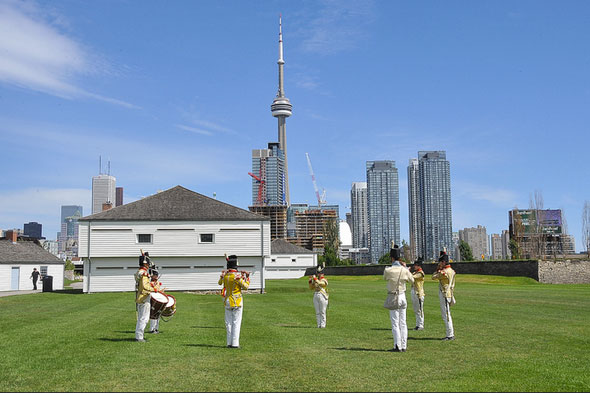
Fort York
Toronto was born at Fort York. The early town grew up east of the military garrison, protected by the natural harbour of the Toronto Islands (then a peninsula,) eventually absorbing its one-time neighbour in the early decades of the 19th century. Many of the current brick buildings at Fort York are replacements for those destroyed during the 1813 Battle of York, which resulted in parts of the city being torched by invading Americans, but the site retains massive historical importance for Toronto and Canada.
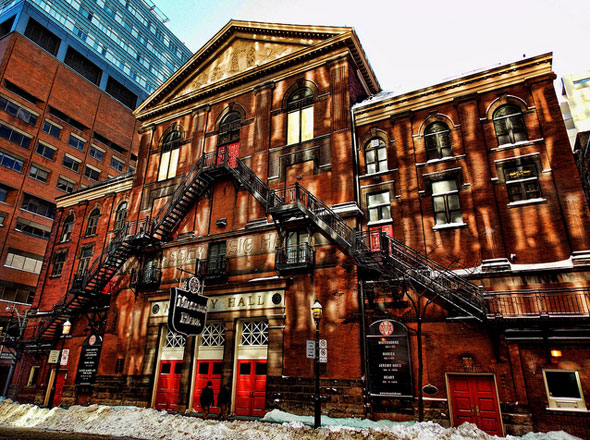
Massey Hall
120-year-old Massey Hall was a gift to the people of Toronto by the Massey family. Hart Massey, the patriarch of the family and founder of H. A. Massey and Company, financed the hall following the death of his son, Charles, from typhoid in 1884. The famous Don Valley pressed red brick building was built between 1893 and 1894 and, thanks to its rich acoustics, became home to the Toronto Symphony Orchestra. Over the decades, everyone from striking railway workers to temperance advocated has used the main hall. The famous fire escape, which the building wears like a distinguished moustache, was added in 1904.
Simpson's (The Bay)
As home base for one half of Toronto's great business rivalries, the Simpson's department store building at the southwest corner of Queen and Yonge (now The Bay) spent decades directly facing its biggest rival, the Timothy Eaton Co. Simpson's built Arcadian Court, an exclusive Art Deco restaurant and event space on the eighth floor, and added the modernist tower at the west end of the block before being bought out by the Hudson's Bay Company. Its rival, Eaton's, replaced its store with the Eaton Centre in the late 1970s, filed for bankruptcy in 1999, and vanished entirely in 2002.
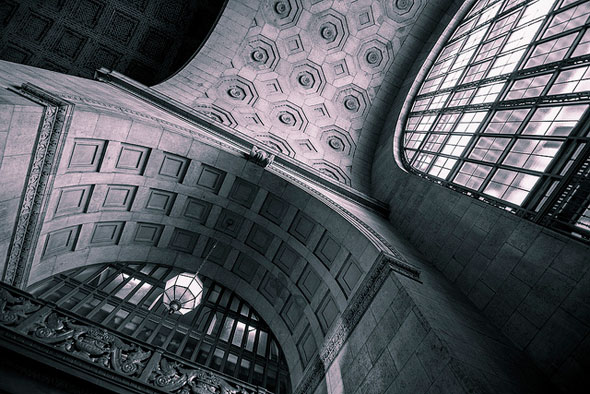
Union Station
The busiest transportation hub in the country is also a National Historic Site of Canada. Completed in 1927 on land cleared by the city's second great fire, massive and imposing Beaux-Arts Union Station has been at the heart of Ontario's rail network for almost 90 years. Every GO rail line passes through its train shed, so too do Via Rail trains operating on the main line between Windsor and Quebec. A $800-million renovation that includes a new train shed and basement level is due to wrap up in 2015.
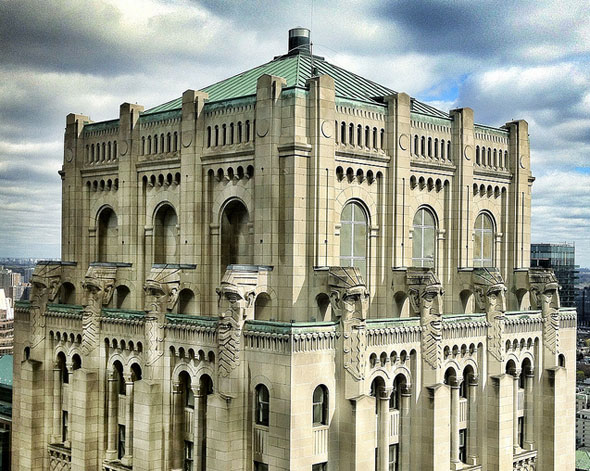
Commerce Court
Now overshadowed by the canyon of bank towers at King and Bay, the great steel and limestone headquarters of the former Canadian Bank of Commerce was the tallest building in the Commonwealth in 1930. Designed by Toronto architectural firm Pearson and Darling (Convocation Hall, Summerhill CPR Station, the AGO,) the tower was "a statement of confidence both in the stability of the bank and in the development of Canada," in the words of its builders. The exquisitely detailed tower features a spectacular vaulted banking hall, an observation deck, and a series of sculpted heads that overlook the city, representing courage, observation, foresight, and enterprise. (It also made a famous backdrop for a visiting airship in 1930.)
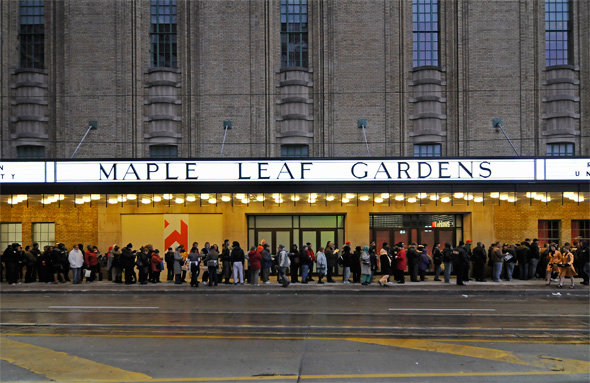
Maple Leaf Gardens
The Toronto Maple Leafs may have spent their most fertile years under the dome at Church and Carlton, winning 11 of their 13 Stanley Cups, but the Gardens was about more than just hockey. Key political rallies, concerts by bands as big as the Beatles, and even the boxing match between Muhammad Ali and George Chuvalo took place within its walls. The building, once the largest arena in the country, was completed in just five months during the summer 1931 and the Leafs played their first game (and won their first cup) on the ice the next season. Thanks to a sensitive make-over, hockey is still played at the Gardens.
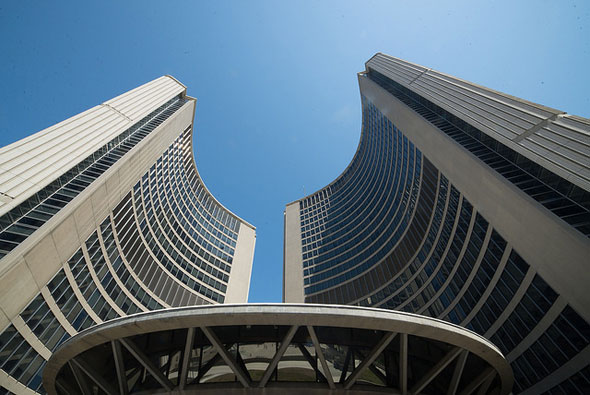
City Hall
Toronto's City Hall will turn 50 next year, yet the curving towers and central council chamber still look as starkly modern as they did in 1965. Designed by Finnish architect Viljo Revell, the winner of a design competition that attracted dozens of proposals, the building came with designer furniture (some of it, including the mayor's desk, made out of concrete,) a massive underground parking garage, and an observation deck on top of the east tower that is now only accessible during the annual Doors Open festival.
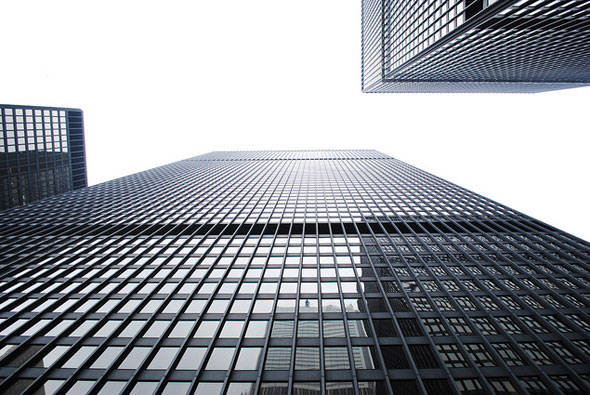
Toronto-Dominion Centre
The original twin towers of T-D Centre were the first major modern era additions to Toronto's skyline. Designed by noted architect Ludwig Mies van der Rohe, the orderly black buildings, which are arranged around a strict mathematical grid, looked completely incongruous among the city's limestone skyscrapers upon their completion in 1969. The attention to detail at T-D Centre is remarkable: the height of the original two of buildings is directly proportionate to their width and depth, and for years the stores in the shopping concourse were required to use the original typeface designed for the complex.
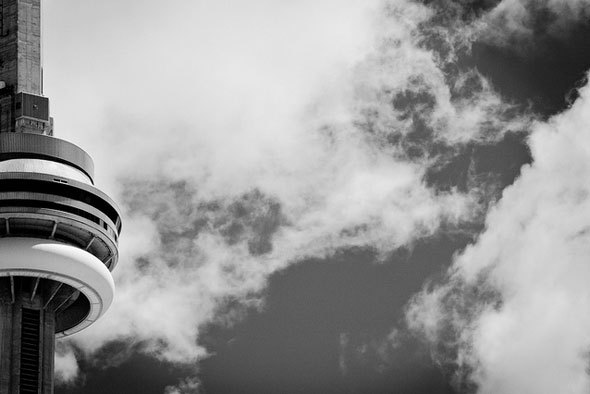
The CN Tower
No building says Toronto to the world like the CN Tower. Love or loathe it, the giant concrete finger to the sky is our Sydney Opera House, Empire State Building, and Palace of Westminster--buildings that, even in silhouette, speak the name of their cities. Named for its builder, Canadian National railways, the 553-metre CN Tower represented the first significant redevelopment of Toronto's sprawling downtown railway lands. Originally conceived as part of a larger project that included housing, offices, and even a subway spur, the CN Tower was completed in June 1976, forever changing the city's skyline.
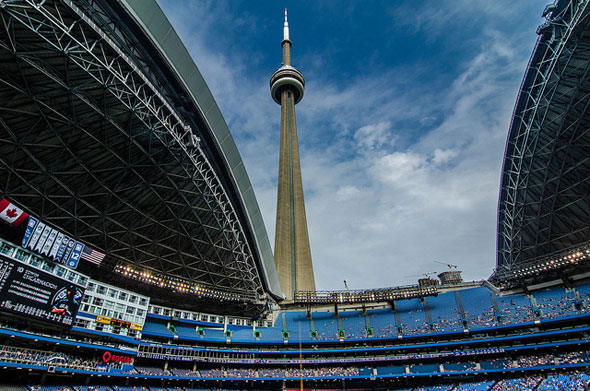
Skydome (Rogers Centre)
The CN Tower-Skydome combination is so natural that it's easy to forget the pair opened more than a decade apart. Toronto's downtown ball park was, like its neighbour, built on surplus railway land in the late 1980s after a lengthy debate about where the city's new stadium should be located (various proposals had been percolating since the 1960s.) The Dome, with its impressive retractable roof, saw perhaps its finest moment in 1993, when Blue Jay Joe Carter slugged a World Series-winning home run into left field. Even though the Jays haven't been able to recreate the magic of the early 1990s, the stadium is still a great place to watch sport.
Chris Bateman is a staff writer at blogTO. Follow him on Twitter at @chrisbateman.
Images: City of Toronto Archives, Adrian Badaraco, The City of Toronto, NickyJameson, David Cantatore, Dean, James Anok, frankisme, Neil Ta, Chris Seifert/blogTO Flickr pool, Derek Flack/blogTO.
Latest Videos
Latest Videos
Join the conversation Load comments







